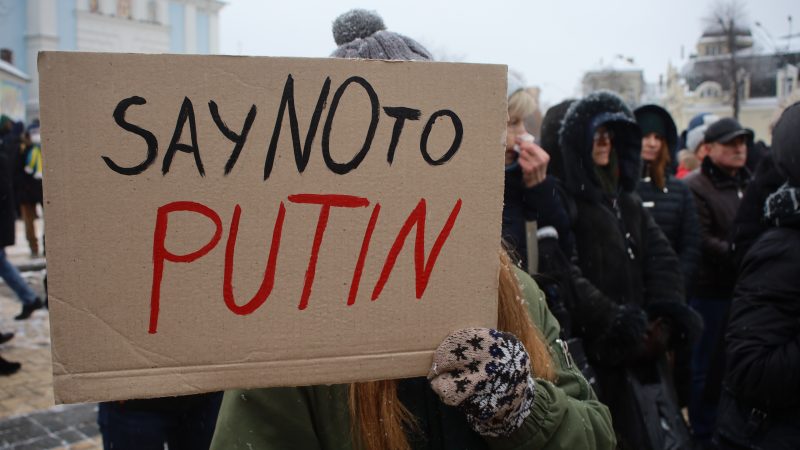
Since Russia’s invasion of Ukraine, there has been an uneasy truce in British politics over the war. There was a sense that voters wanted to see the parties work together. As Labour shifts onto a general election footing, that’s starting to change. In his speech announcing Labour’s mission on clean energy in Leith, Keir Starmer made a case for the renewable transition in national security terms, pitching a plan that would “get Putin’s boot off our throat”.
It’s a welcome development, because behind the headline-grabbing trips to Kyiv and the photo shoots with President Zelensky, the government has been failing Ukraine on Russian oil. That matters. Even as Ukraine kickstarts reconstruction, Russia’s war effort remains propped up by massive and growing oil and gas exports. Shockingly, Russia exported more oil in April from its western ports than any month in the past four years.
The argument is there for Labour to win. The British public still prefer the Tories on defence and security. But they also want more clean energy and despise Vladimir Putin. By highlighting the link between fossil fuels and war by being tough on Russian oil, Labour can hasten an end to the war in Ukraine, make Britain safer and accelerate the transition.
Loopholes allowing firms to profit from Russian fuel must be closed
But how, exactly? It starts with our imports of Russian fuel. It’s illegal to import Russian oil directly into the UK, and yet we’re still buying Russian-origin fuel that has been refined in other countries. The UK imported 5.2 million barrels of refined fuel from India in the first five months of the year – more than 6% of our imports – all of which came from refineries running on Russian oil. This loophole in the sanctions keeps Russian oil flowing around the world and revenues flowing to Putin. It should be closed immediately.
Beyond the UK’s consumption of Russian fuel, UK plc continues to help Putin sell oil and gas around the world. Back in May 2022, the UK announced plans to ban the insurance of Russian oil shipments, in tandem with the EU. It was a hugely significant step because of the dominance of British firms in the maritime insurance sector.
But later that summer, Rishi Sunak’s Treasury quietly watered down the ban to allow British firms to trade Russian oil globally. Today, firms in the City of London are still helping Russia sell oil, and Shell is selling huge quantities of Russian gas to China. None of this is in our national interest. Labour should end this trade and stop UK firms enabling Putin’s exports.
We must beef up enforcement to ensure existing rules are followed
That said, new rules will do nothing if the UK fails to enforce them. The total ban on the trade of Russian oil was eventually replaced by the G7 price cap, which allows firms to trade Russian oil so long as cargoes cost less than $60 per barrel. Since coming into force, investigations have repeatedly shown that the cap is being breached routinely.
Yet when the Treasury was contacted earlier this year, they disclosed they had collected just five attestations (documents companies must produce to declare the compliance of their cargoes) in the entire scheme. Despite abounding evidence, the Treasury is yet to issue any penalties under the Russia sanctions. Enforcing the rules we have is the bare minimum – Labour should beef up enforcement and set a precedent by issuing penalties to offenders.
Profits from Russian oil should be invested in Ukraine’s reconstruction
Finally, Labour should extend the windfall tax principle to Russian oil profits. Britain’s oil giants claim to have left Russia. But BP still owns nearly 20% of Russian oil major Rosneft and was paid at least £580m in dividends in 2022 as a result. And Shell is set to receive more than £900m for its stake in a Russian gas field that it claimed it had written off.
The Ukrainian government has called for this “blood money” to be redirected to the reconstruction of Ukraine. There’s a precedent here, set by Shell themselves. After an opportunistic purchase of a discounted cargo of Russian crude, made as tanks were bearing down on Kyiv, Shell apologised profusely and gave the profits from the transaction to humanitarian programmes in Ukraine.
The government has failed to act and redirect any of these Russian oil profits to Ukraine or even to condemn the behaviour. The UK is rightly committed to supporting Ukraine financially for the long run. These billions would go a long way on the ground and would alleviate costs for UK taxpayers.
Now is the time to double down on measures that dent Putin’s war machine
As Starmer pointed out in Leith, the war has made it painfully clear that fossil fuels are a major threat to the UK’s national security. These failures on Russian oil matter – not just for Ukraine and not just so that we end the war as quickly as possible. It matters for the UK’s long-term security and prosperity. It makes no sense to at the same time support Ukraine with crucial military hardware and aid, while funding destruction on the backend.
Getting Russian fossil fuels out of our energy system and impairing Russia’s ability to export them is in the UK’s national interest. And the Tories are neglecting it. Now is the time to double down on measures that dent Putin’s war machine. Labour should lead the charge.




More from LabourList
Labour place third in Gorton and Denton by-election as Greens gain seat
‘What Batley and Spen taught me about standing up to divisive politics’
‘Security in the 21st century means more than just defence’